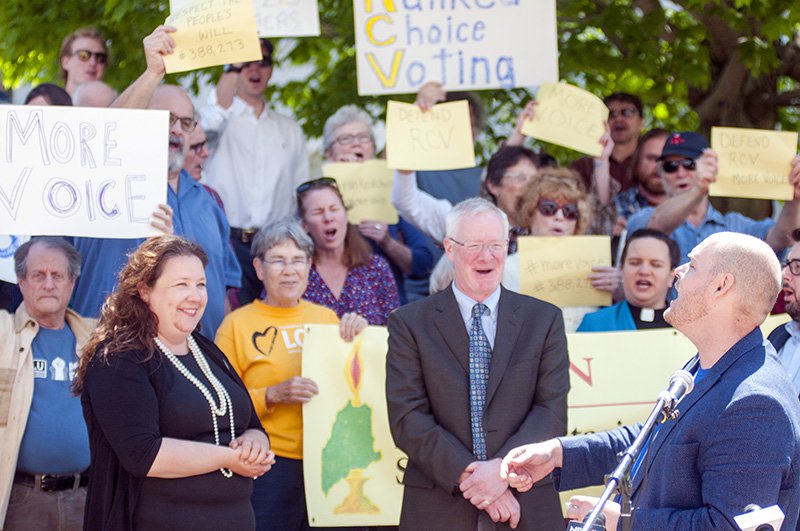A bill delaying Maine’s switch to a ranked-choice voting system will apparently become law without Gov. Paul LePage’s signature.
LePage, a vocal opponent of the ranked-choice voting ballot initiative passed by voters last year, told Maine Public on Friday that he will neither sign nor veto the bill that delays adoption of the new system until 2021. Instead, LePage indicated he will allow the bill to take effect without his signature.
The governor’s communications office did not respond to a request for comment from the Portland Press Herald on Friday evening.
But LePage’s decision to hold onto the bill for the full 10 days allowed under Maine’s Constitution could hamper supporters of ranked-choice voting from gathering signatures on Election Day for a “people’s veto” to implement the process without delay. Even so, LePage seemed to welcome the prospect of a people’s veto campaign.
“I encourage the people that want to have a people’s veto to bring it in,” LePage told Maine Public Radio. “It will be … the Supreme Court has already said it’s unconstitutional, so let the courts decide.”
Under a ranked-choice system, voters rank candidates in order of preference. If no candidate receives more than 50 percent of the vote after the first tabulation, the candidate with the fewest votes would be eliminated. Voters who rank the eliminated candidate at the top of their list then have their ballots added to the totals of their second-ranked candidates, and the ballots are counted again. The process continues until one candidate has a clear majority.
Last November, an initiative to make Maine the first state to adopt ranked-choice voting passed by a margin of 52 percent to 48 percent at the ballot box. But Maine’s Supreme Judicial Court said in a May advisory opinion that parts of the law that applied to gubernatorial and legislative races were unconstitutional.
The court’s advisory opinion sparked months of legislative wrangling over whether to repeal the ranked-choice voting law, seek amendments to the Maine Constitution or allow it to take effect while anticipating a likely court challenge.
After a proposed constitutional amendment failed to pass the Legislature, lawmakers passed a bill last month that delays implementation of ranked-choice voting until 2021. But the bill would also repeal the system entirely if Maine’s Constitution has not been amended to address the legal concerns by then.
The bill infuriated supporters of ranked-choice voting, who are already gearing up for a “people’s veto” of the delay/repeal bill next June. The question now is whether they can begin collecting the 61,123 signatures needed to trigger a “people’s veto” on Election Day outside of polling places around the state.
Before the campaign can begin collecting signatures, Secretary of State Matt Dunlap must approve the application and petitions. Dunlap has 10 days – or until Nov. 13, in this case – to review the materials and approve the language.
Kyle Bailey, spokesman for the Committee for Ranked-Choice Voting, said the campaign delivered the application and petitions to Dunlap’s office last Friday in anticipation that LePage would hold onto the bill for the full 10 days.
“We are waiting for the Secretary of State’s Office to approve our (application) to begin collecting signatures,” Bailey said Friday night. “We have hundreds of Mainers who have already reached out to us to circulate petitions … He has had them for about a week, so (Dunlap) certainly has what he needs from us to move forward.”
Dunlap said his office has “absolutely been working on it” but that this week’s massive windstorm, which knocked out power to nearly 500,000 customers, has complicated matters. Some towns were still waiting for electricity to be restored Friday, and Dunlap said his office’s top priority is ensuring next Tuesday’s elections run smoothly.
Also, Dunlap said this “people’s veto” is particularly complex because it deals with repealing parts of a law that delayed (and possibly repealed) the implementation of ranked-choice voting in Maine.
“We want to make sure we get the language in a form that would be understandable to a voter that is going to be seeing it for the first time,” Dunlap said. So far, none of the versions Dunlap has seen passed muster.
“I don’t know if I’m going to get it done by Monday,” Dunlap said.
The wording of the “people’s veto” wouldn’t be the only potentially confusing aspect of a vote next June, however.
If supporters collect enough valid signatures, the law passed last month by the Legislature to delay implementation of ranked-choice voting would, in turn, be suspended pending the vote. That means ranked-choice voting will be in place next June, creating a scenario in which Mainers would use the new system for the first time in gubernatorial and other primary elections even as they decide whether to veto the law delaying/repealing the ranked-choice system.
Kevin Miller can be contacted at 791-6312 or at:
Twitter: KevinMillerPPH
Send questions/comments to the editors.



